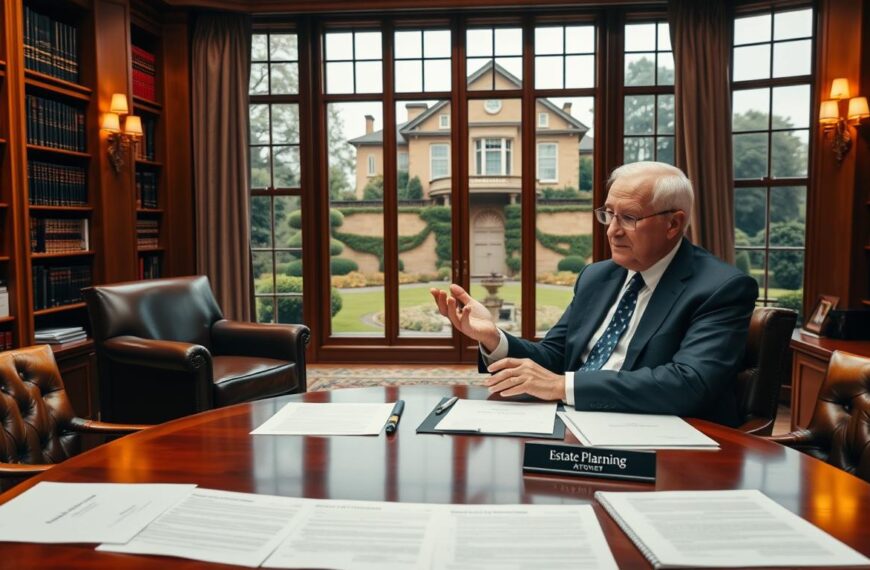Estate planning is a crucial aspect of securing your family’s future and protecting your hard-earned assets. However, many individuals overlook this important step. Approximately 55% of adults in the UK do not have a will or estate plan in place1, highlighting the need for professional guidance.
An estate planning lawyer specialises in creating legal documents such as wills and trusts. Their role involves drafting these documents to ensure your wishes are respected and your wealth is distributed according to your plans. They also provide advice on tax efficiency and asset protection.
Planning for the future is not just about wealth distribution. It also involves ensuring your loved ones are protected and your wishes are honoured. An estate planning lawyer can help you navigate complex legal processes, such as probate, and minimise inheritance tax liabilities2.
A good estate planning attorney takes a holistic approach, considering your family circumstances and current financial needs. They can help you create a plan that not only protects your assets but also ensures your wealth is preserved and distributed according to your wishes.
In this article, we will guide you through the process of finding a reputable estate planning attorney. We will cover key aspects such as their roles, responsibilities, and the benefits of hiring one. By the end of this guide, you will have a clear understanding of how to protect your family’s future with the right legal support.
Understanding the Importance of Estate Planning
Effective estate planning is more than just drafting legal documents—it’s about ensuring your wishes are honoured and your loved ones are protected. Proper planning helps you control how your assets are distributed, avoiding potential disputes and legal complications.
Protecting Assets and Managing Inheritance Tax
A key aspect of estate planning is safeguarding your assets from unforeseen circumstances. By creating a trust or will, you can ensure your wealth is distributed according to your wishes. Inheritance tax mitigation is another critical component, as it helps reduce the financial burden on your family. Utilising exemptions and allowances can significantly lower tax liabilities, making the process more manageable3.
Planning for the Future of Your Loved Ones
Estate planning isn’t just about assets; it’s about securing your family’s future. A well-structured plan ensures that your loved ones are financially stable after your passing. This includes making provisions for children, spouses, and other dependents. Starting the process early allows you to address potential legal and tax complexities efficiently, providing peace of mind for years to come.
| Benefits of Estate Planning | Key Considerations |
|---|---|
| Asset Protection | Ensures your wealth is distributed as intended |
| Tax Efficiency | Minimises inheritance tax liabilities |
| Family Security | Provides financial stability for loved ones |
| Legal Clarity | Reduces the risk of legal disputes |
Regular reviews of your estate plan are essential, especially after major life events like marriage, divorce, or the birth of a child. This ensures your plan remains relevant and effective in safeguarding your family’s future4.
Role and Responsibilities of an Estate Planning Lawyer
Estate planning lawyers play a pivotal role in helping individuals and families secure their futures. Their expertise extends beyond legal documentation, encompassing strategic planning to protect assets and ensure wishes are honoured.
Drafting Wills and Trusts
A primary responsibility of these lawyers is creating clear and enforceable wills and trusts. They ensure that legal documents accurately reflect their clients’ intentions, whether it’s distributing assets or appointing guardians for minors. For instance, approximately 55% of adults over 50 lack an estate plan, highlighting the need for such legal guidance5.
Comprehensive Legal Guidance
Beyond documentation, estate planning lawyers offer advice on tax efficiency and asset protection. They help clients navigate probate complexities and minimize inheritance taxes. For example, preparing for meetings with an attorney can streamline the process, ensuring all aspects are covered. International considerations and nuanced probate laws are also key areas they address, providing tailored strategies for each client’s unique situation.
Specialised certifications, such as those from ACTEC Fellows, ensure high-quality legal advice. These certifications involve rigorous exams, guaranteeing that lawyers are well-versed in estate planning complexities. This expertise helps in creating robust plans that effectively mitigate tax liabilities and ensure proper distribution of assets to beneficiaries.
Professional legal assistance is crucial for navigating the intricate legal landscape. Lawyers help clients avoid potential disputes and ensure that their wishes are honoured. For more insights into their roles, you can visit this resource to explore their responsibilities in depth.
How to Find a Good Estate Planning Attorney
Locating a reputable estate planning attorney is essential for ensuring your family’s future is secure. A well-qualified attorney can guide you through complex legal processes, such as probate and inheritance tax mitigation6.
Using Specialised Certification and Referrals
Start by researching online and verifying specialisation credentials. Look for board certification in wills, trusts, and estates, such as those offered in Florida6. These certifications indicate that the attorney has passed rigorous exams, ensuring expertise in estate planning.
Referrals from trusted sources, such as friends, family, or other legal professionals, are invaluable. For instance, satisfied clients of real estate or family law services often recommend reliable estate planning attorneys6. Additionally, directories like Martindale-Hubbell provide reliable lawyer-to-lawyer ratings, helping you identify skilled attorneys7.
Visit the attorney’s website to review their specialised services and client testimonials. Many attorneys offer brief initial consultations, usually around 15 minutes, to assess compatibility and discuss your needs6. This meeting allows you to evaluate their communication style and professional experience.
Using specialised certification and referrals can significantly narrow down your search. Ensure the attorney is a member of reputable professional organisations, such as ACTEC Fellows, which invite attorneys based on their estate planning experience6. This membership indicates a high level of expertise and commitment to their field.
Key Estate Planning Services and Strategies
Estate planning encompasses a range of services designed to protect your assets and ensure your wishes are honoured. A well-structured plan involves more than just legal documents; it’s about securing your family’s future and managing your wealth effectively.
Making an Effective Will
A will is the cornerstone of any estate plan. It ensures your assets are distributed according to your wishes and prevents intestacy issues. A valid will must be witnessed and signed, clearly outlining your intentions to avoid legal disputes. As of recent data, only 29% of people have formalised their wills, highlighting the need for prompt action8.
“A properly drafted will is your voice when you can no longer speak for yourself.”
Inheritance Tax Mitigation and Lifetime Giving
Inheritance tax can significantly reduce the value of your estate. Utilising exemptions like the nil-rate band and establishing trusts are effective strategies to mitigate these taxes. Lifetime giving and charitable donations can also reduce the taxable value of your estate, providing both financial and emotional benefits.
International Estate Planning Considerations
For those with assets overseas, understanding local laws is crucial. An estate planning lawyer can help navigate these complexities, ensuring your international assets are protected and distributed according to your wishes.
A comprehensive estate plan streamlines the process, reducing complexity and ensuring your wishes are honoured. Tailoring strategies to individual circumstances is essential for effective estate planning.
Understanding Tax, Trust and Inheritance Issues
Tax, trust, and inheritance planning are intricate aspects of estate planning that require careful consideration. With the UK’s inheritance tax threshold set at £325,0009, understanding how to navigate these areas is crucial for protecting your assets and ensuring your family’s financial security.
Utilising Tax Allowances and Reliefs
Strategic use of tax allowances and reliefs can significantly reduce inheritance tax liabilities. The Residence Nil Rate Band (RNRB), introduced in 2017, provides an additional threshold of £175,000 for residential property passed to direct descendants9. This can increase the total threshold for married couples to £1 million. Lifetime trusts and gifts made at least seven years before death can also help mitigate taxes, potentially reducing the average inheritance tax bill of £200,0009.
Managing Complex Property and Business Assets
Complex assets, such as business interests and international properties, add layers of complexity to estate planning. Approximately 40% of estates in the UK are subject to inheritance tax9, making it essential to employ tailored strategies. Professional advice is vital to navigate these challenges effectively, ensuring your wishes are honoured and your assets are protected.
With the right legal guidance, you can create a robust estate plan that addresses tax efficiencies and complex asset management, securing your family’s future with confidence.
What to Expect in Your Estate Planning Consultation
Understanding what to expect during your initial consultation with an estate planning lawyer can make the process less daunting. This meeting is your opportunity to discuss your objectives, concerns, and questions openly.
Initial Assessments and Setting Objectives
The consultation begins with an assessment of your current situation, including your assets, family dynamics, and financial goals. This helps the lawyer understand your needs and provide tailored advice. For instance, they will discuss how to protect your assets and minimise tax liabilities, ensuring your wishes are honoured10.
Evaluating Communication and Compatibility
Communication is key. Ask about their experience with cases similar to yours and their approach to estate planning. Assess whether you feel comfortable discussing sensitive topics, as a good rapport is essential for a successful partnership.
| Key Questions to Ask | Purpose |
|---|---|
| What experience do you have with estate planning? | To ensure the lawyer is knowledgeable in your specific needs. |
| How will you help me achieve my goals? | To understand their strategy and approach. |
| How will we stay in touch throughout the process? | To establish clear communication channels. |
A productive consultation sets the foundation for a well-structured estate plan, addressing both immediate and long-term goals. It’s about more than legal documents; it’s about securing your family’s future with confidence.

Conclusion
In conclusion, securing your legacy and ensuring the financial security of your loved ones is a vital responsibility. Engaging a specialised estate planning attorney is essential to navigate the complexities of estate planning, tax mitigation, and asset protection. As highlighted throughout this guide, approximately 70% of adults lack a will or estate plan11, underscoring the need for professional guidance.
A skilled attorney offers tailored advice, ensuring your wishes are honoured and your assets are safeguarded. They can help you implement effective tax strategies, such as utilising the Residence Nil Rate Band12, to minimise inheritance tax liabilities. Professional legal support is crucial for addressing complex assets and ensuring your estate plan is robust and adaptable to life changes.
Don’t delay in seeking expert advice. A well-structured estate plan is a valuable investment in your family’s future. Take the next step by consulting a reputable estate planning specialist to address your unique needs and ensure your legacy is protected with confidence.
FAQ
What is estate planning and why is it important?
Estate planning ensures your assets are distributed according to your wishes, protects your loved ones, and minimises tax liabilities. It provides peace of mind knowing your family is secure.
What documents are essential in estate planning?
Key documents include a will, power of attorney, and trusts. These ensure your wishes are followed and your assets managed effectively during your lifetime and beyond.
How does a trust work in estate planning?
A trust allows you to transfer assets to beneficiaries on specific terms, managed by a trustee. It can avoid probate, reduce taxes, and control asset distribution.
What is probate and how can it be avoided?
Probate is the legal process of validating a will. It can be avoided through trusts, joint ownership, and beneficiary designations, ensuring assets pass directly to heirs.
What is a power of attorney and why is it necessary?
A power of attorney grants someone authority to manage your financial and personal affairs if you’re incapacitated. It ensures your wishes are honoured even when you can’t act.
How can I reduce inheritance tax liabilities?
Strategies include gifting, utilising tax allowances, and setting up trusts. Consulting a professional helps optimise your approach within legal boundaries.
What should I consider when choosing a beneficiary?
Consider each beneficiary’s needs, financial situation, and potential dependencies. Ensure your choices align with your estate plan’s objectives.
How often should I review my estate plan?
Review your plan every 3-5 years or after significant life events like marriage, divorce, or the birth of a child to ensure it remains relevant and effective.
What is the role of an estate planning lawyer?
They provide legal guidance, draft documents, and ensure your plan complies with the law. Their expertise helps protect your assets and family’s future.
What happens if I die without a will?
Without a will, your assets are distributed according to intestacy laws, which may not reflect your wishes. This can lead to disputes and legal complications for your family.
Can I make changes to my will after it’s written?
Yes, you can amend your will through a codicil. Significant changes may require a new will to ensure clarity and legal validity.
How does estate planning affect business assets?
Proper planning ensures business continuity, protects company assets, and facilitates smooth ownership transfer, safeguarding your legacy and stakeholders’ interests.
What is the difference between a will and a trust?
A will directs asset distribution after death, while a trust manages assets during your life and beyond, offering control and tax benefits.
Source Links
- https://singhlawfirm.com/what-is-the-role-of-an-estate-planning-attorney/
- https://www.brownhobkirk.com/blog/what-does-an-estate-planning-attorney-do/
- https://www.forbes.com/councils/forbesbusinesscouncil/2020/03/10/how-to-choose-an-estate-planning-lawyer/
- https://cressetcapital.com/post/how-to-choose-an-estate-planning-attorney-9-questions-to-ask/
- https://www.linkedin.com/pulse/what-role-estate-planning-lawyer-how-can-help-you-dan-l-wyde
- https://www.actec.org/resource-center/video/how-to-choose-an-estate-planning-attorney/
- https://www.barrattorneys.com/blog/how-to-find-a-good-estate-planning-attorney/
- https://www.shma.co.uk/our-thoughts/for-life-wills-trusts-estates-estate-planning/
- https://www.irwinmitchell.com/personal/wills-trusts-estates/estate-planning
- https://burnerlaw.com/blog/what-to-expect-at-your-estate-planning-consultation/
- https://trustandwill.com/learn/estate-planning-attorney?srsltid=AfmBOoq6rKqGddlwJJa0yb-biWYA4HHV4EKBa8Mb8DUthLtC1aSrWEac
- https://www.ocestateplanning.net/law-blog/2023/october/how-to-select-the-right-estate-planning-attorney/

















